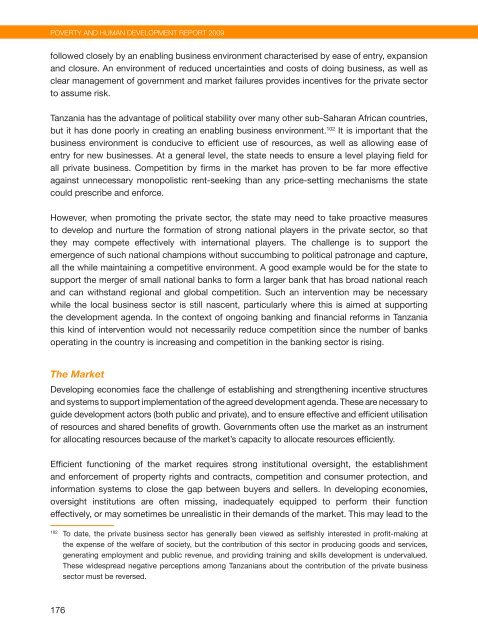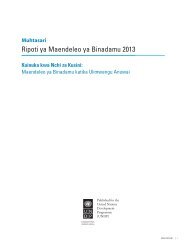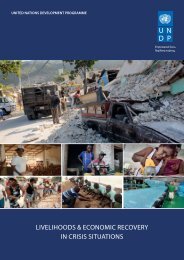Poverty and Human Development Report 2009 - UNDP in Tanzania
Poverty and Human Development Report 2009 - UNDP in Tanzania
Poverty and Human Development Report 2009 - UNDP in Tanzania
Create successful ePaper yourself
Turn your PDF publications into a flip-book with our unique Google optimized e-Paper software.
pOVertY aND hUMaN DeVeLOpMeNt repOrt <strong>2009</strong><br />
followed closely by an enabl<strong>in</strong>g bus<strong>in</strong>ess environment characterised by ease of entry, expansion<br />
<strong>and</strong> closure. An environment of reduced uncerta<strong>in</strong>ties <strong>and</strong> costs of do<strong>in</strong>g bus<strong>in</strong>ess, as well as<br />
clear management of government <strong>and</strong> market failures provides <strong>in</strong>centives for the private sector<br />
to assume risk.<br />
<strong>Tanzania</strong> has the advantage of political stability over many other sub-Saharan African countries,<br />
but it has done poorly <strong>in</strong> creat<strong>in</strong>g an enabl<strong>in</strong>g bus<strong>in</strong>ess environment. 102 It is important that the<br />
bus<strong>in</strong>ess environment is conducive to efficient use of resources, as well as allow<strong>in</strong>g ease of<br />
entry for new bus<strong>in</strong>esses. At a general level, the state needs to ensure a level play<strong>in</strong>g field for<br />
all private bus<strong>in</strong>ess. Competition by firms <strong>in</strong> the market has proven to be far more effective<br />
aga<strong>in</strong>st unnecessary monopolistic rent-seek<strong>in</strong>g than any price-sett<strong>in</strong>g mechanisms the state<br />
could prescribe <strong>and</strong> enforce.<br />
However, when promot<strong>in</strong>g the private sector, the state may need to take proactive measures<br />
to develop <strong>and</strong> nurture the formation of strong national players <strong>in</strong> the private sector, so that<br />
they may compete effectively with <strong>in</strong>ternational players. The challenge is to support the<br />
emergence of such national champions without succumb<strong>in</strong>g to political patronage <strong>and</strong> capture,<br />
all the while ma<strong>in</strong>ta<strong>in</strong><strong>in</strong>g a competitive environment. A good example would be for the state to<br />
support the merger of small national banks to form a larger bank that has broad national reach<br />
<strong>and</strong> can withst<strong>and</strong> regional <strong>and</strong> global competition. Such an <strong>in</strong>tervention may be necessary<br />
while the local bus<strong>in</strong>ess sector is still nascent, particularly where this is aimed at support<strong>in</strong>g<br />
the development agenda. In the context of ongo<strong>in</strong>g bank<strong>in</strong>g <strong>and</strong> f<strong>in</strong>ancial reforms <strong>in</strong> <strong>Tanzania</strong><br />
this k<strong>in</strong>d of <strong>in</strong>tervention would not necessarily reduce competition s<strong>in</strong>ce the number of banks<br />
operat<strong>in</strong>g <strong>in</strong> the country is <strong>in</strong>creas<strong>in</strong>g <strong>and</strong> competition <strong>in</strong> the bank<strong>in</strong>g sector is ris<strong>in</strong>g.<br />
The Market<br />
Develop<strong>in</strong>g economies face the challenge of establish<strong>in</strong>g <strong>and</strong> strengthen<strong>in</strong>g <strong>in</strong>centive structures<br />
<strong>and</strong> systems to support implementation of the agreed development agenda. These are necessary to<br />
guide development actors (both public <strong>and</strong> private), <strong>and</strong> to ensure effective <strong>and</strong> efficient utilisation<br />
of resources <strong>and</strong> shared benefits of growth. Governments often use the market as an <strong>in</strong>strument<br />
for allocat<strong>in</strong>g resources because of the market’s capacity to allocate resources efficiently.<br />
Efficient function<strong>in</strong>g of the market requires strong <strong>in</strong>stitutional oversight, the establishment<br />
<strong>and</strong> enforcement of property rights <strong>and</strong> contracts, competition <strong>and</strong> consumer protection, <strong>and</strong><br />
<strong>in</strong>formation systems to close the gap between buyers <strong>and</strong> sellers. In develop<strong>in</strong>g economies,<br />
oversight <strong>in</strong>stitutions are often miss<strong>in</strong>g, <strong>in</strong>adequately equipped to perform their function<br />
effectively, or may sometimes be unrealistic <strong>in</strong> their dem<strong>and</strong>s of the market. This may lead to the<br />
102 To date, the private bus<strong>in</strong>ess sector has generally been viewed as selfishly <strong>in</strong>terested <strong>in</strong> profit-mak<strong>in</strong>g at<br />
the expense of the welfare of society, but the contribution of this sector <strong>in</strong> produc<strong>in</strong>g goods <strong>and</strong> services,<br />
generat<strong>in</strong>g employment <strong>and</strong> public revenue, <strong>and</strong> provid<strong>in</strong>g tra<strong>in</strong><strong>in</strong>g <strong>and</strong> skills development is undervalued.<br />
These widespread negative perceptions among <strong>Tanzania</strong>ns about the contribution of the private bus<strong>in</strong>ess<br />
sector must be reversed.<br />
176





